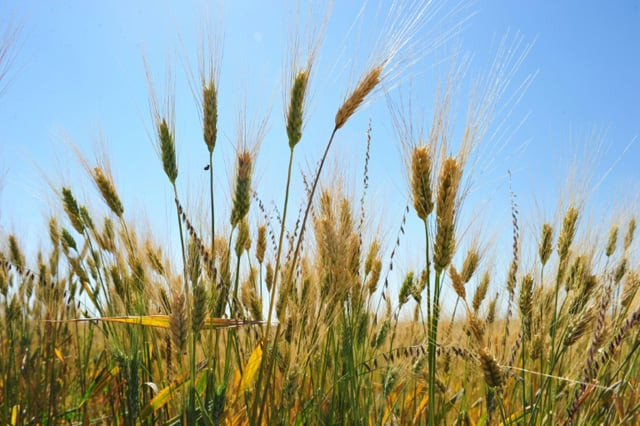Promoting food safety
Climate change in Sindh can increase the susceptibility of crops to a given pest or disease

PHOTO: AFP
Pest damage in Sindh concerns fruit trees in the fertile areas of various districts. Date, mango and banana trees are being affected in large plantations and smallholdings alike. Increasing the agrochemical spray regime to cope with this threat is an alarming prospect. Already, the high amounts of pesticides used on fruit and vegetables are distressing. Moreover, pesticide sprays are being used far too frequently, even on a daily basis. There is no doubt that most of the so-called “fresh” fruit and vegetables sold in Sindh possess pesticide residue way above what is permitted under the Sindh government’s regulations. Yet the residue levels and agricultural practices that cause this toxicity are not being monitored. As a result, the population is being poisoned on a massive scale, whether they buy from local markets or from grocery stores.
Those who spray these chemicals are also being poisoned due to the negligence of regulations related to health and safety. Women who pick cotton in the fields are at risk as they absorb chemical residues present in the cotton, resulting in breathing problems, eczema, vomiting and dizziness. The toxins are also passed on to infants through pregnancy and nursing. The cost of medical treatment for the cotton pickers, who are incapacitated and cannot work, is enormous. Sixty-three per cent of households report medical conditions during the cotton spraying season, whilst 87% of female cotton pickers report illnesses. It’s a matter of serious concern as the high levels of pesticide residue in crops result in the poisoning of land, waterways and drinking water supplies.
Synthetic pesticides are hardly needed for food crops in Sindh, and far lower dosages are appropriate. Alternative methods are also available, including pest-tolerant seed varieties/ landraces, natural and locally available pesticides such as garlic and chilli, pest specific pesticides which don’t kill or harm insects, and soil sterilisation to reduce fungal attacks in the seed bed. This technique is called Integrated Pest Management (IPM) which involves measures that do not involve an indiscriminate use of pesticides and “manages” the pest population by reducing it without completely eliminating it.
Pakistan ranks high in the global production rankings for several crops, such as wheat and rice with much of the national product being exported. Policymakers understandably want to increase production and productivity to feed the burgeoning population as much of it is currently food insecure and vulnerable to food insecurity, and still allow surplus for export. The production levels of many crops are way below those achieved in the developed world. Definitely, food produced under an IPM regime would be free of pesticide residue, and thus enable high-end market outlets to be sought for fruits and vegetables, locally as well as for export, as currently, pesticide residue prevents much of the Pakistani produce from being exported to developed countries.
Published in The Express Tribune, November 10th, 2019.
Like Opinion & Editorial on Facebook, follow @ETOpEd on Twitter to receive all updates on all our daily pieces.















COMMENTS
Comments are moderated and generally will be posted if they are on-topic and not abusive.
For more information, please see our Comments FAQ